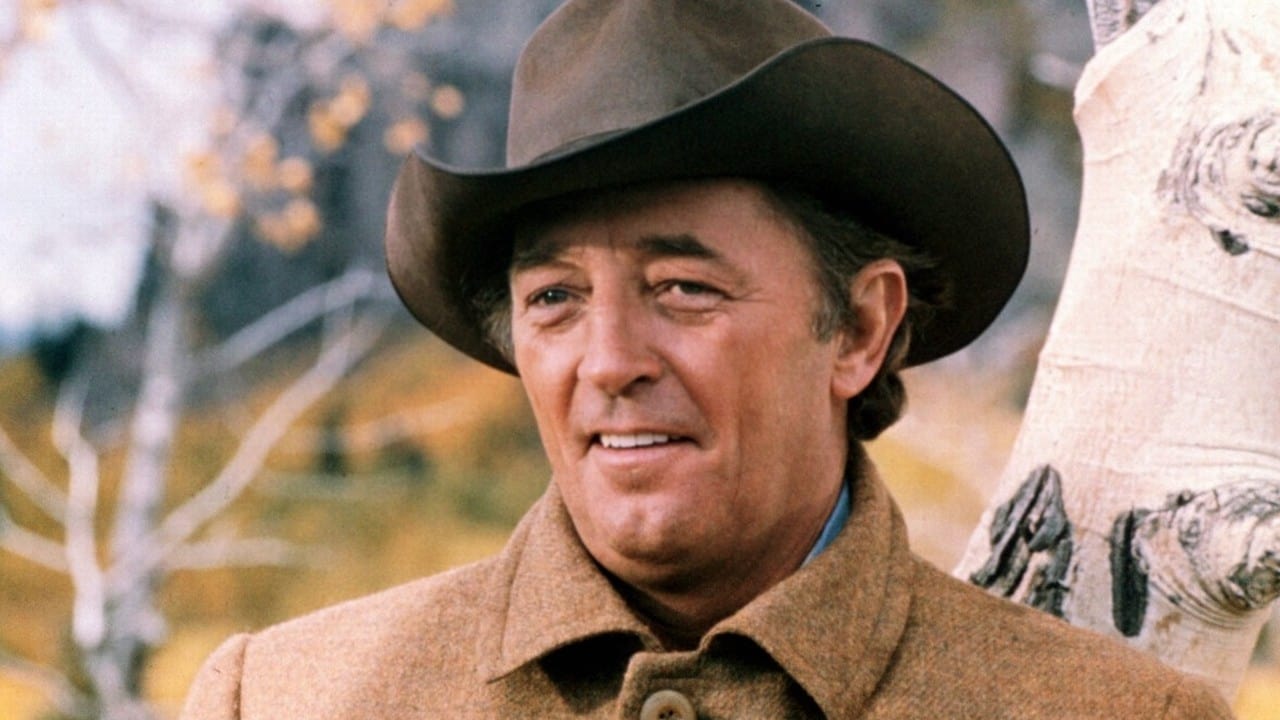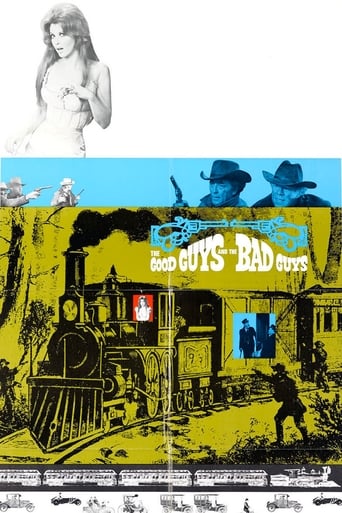doug-balch
This is a very entertaining Burt Kennedy Western, very much in the mold of "The War Wagon", although it more often crosses the line into straight comedy. I gave it five stars in my IMDb ranking. I ended up classifying it as a comedy, which I don't rank in my all time great Westerns system (I haven't figured out yet why I don't, it just feels like comedies should be ranked against each other in their own category). Here's what I liked: Robert Mitchum and George Kennedy are very good in this as an aging lawman and outlaw who become "frenemies". Both of these guys are very underrated actors. I can't think of a movie Kennedy was in that I didn't enjoy. Martin Balsam practically steals the movie as the corrupt mayor. A really great comedic performance that was clearly the inspiration for Harvey Corman's governor character in "Blazing Saddles" a couple of years later. This movie really got me interested in Balsam. Looks like he was one of the early Actor's Studio guys like Eli Wallach. I only remember him from "Psycho" and "Hombre". Dude had some range. I'm going to make a point of watching some more of his work. Nice location filming in New Mexico. Some pretty good action set pieces with a locomotive. Story moves along nicely, it's easy to get involved in the characters, there are no gaping plot holes. Kennedy plays a notorious bank robber who everyone thinks was killed 10 or 15 earlier. In reality, he got married to a Quaker woman, went straight and was living in Canada. After she dies from fever, he leaves an 11 year old son behind to return to the U.S. and resume his career as a bank robber. Sound like someone we know? Hint: Clint Eastwood played the part. Here's what wasn't so great: Ridiculous title David Carridine has a part.
classicsoncall
I love it when the title of the film keeps it simple - "The Good Guys and the Bad Guys". Can't make it any plainer than that for a Western. The two main characters keep it simple too; Robert Mitchum as the forcibly retired Marshal Flagg, and George Kennedy as old time nemesis Big John McKay. The pair team up after upstart Waco (David Carradine) takes over McKay's old gang, and gives him the bum's rush in a classic case of age discrimination. Back then you couldn't sue for such things.This one is played for grins as much as it is for tough guy action. The smarmy and lascivious mayor of Progress is played by Martin Balsam, prone to getting caught with his pants down both literally and figuratively. I'm not sure what the Tina Louise character found interesting enough in the mayor to be caught dead in the same room with him. There was a line about her being a victim of internal combustion, so maybe that was it.Something I never saw in a Western before, actually two things - there's a cool scene with an out of control buckboard where the two horses pulling it straddle a telephone pole - yikes! And how about McKay's spin around after being hit by a bullet in the shoulder trick. Very effectively done.This probably won't be on anyone's list of Ten Best Westerns, but it's entertaining enough to devote the hour and a half or so to watch it. Mitchum and Kennedy play well off each other, and I liked the idea that they hooked up on a handshake, the way men of integrity used to do such things. I'm still wondering though why Buddy Hackett was in that opening crowd scene.
zardoz-13
Director Burt Kennedy's "The Good Guys & the Bad Guys" lacks the inspired hilarity of his early outing with James Garner in "Support Your Local Sheriff." Mind you, this glossy, lavishly-produced twentieth century spoof of horse operas boasts its share of moments, but the storyline does an inferior job of blending comedy with drama. More often than not, the drama overshadows the comedy. The theme of this outdoors yarn is age versus youth.Traditionally, westerns espouse conservative values, and one value is respect for your elders. When should somebody be put out to pasture because they are past their prime and no longer useful to society? In Don Siegel's superlative western "Death of a Gunfighter," Richard Widmark played a town-taming lawman who refused to quit his job long after the dust had settled and the townspeople took it upon themselves to finish him off. In "The Good Guys & the Bad Guys," Robert Mitchum plays Marshal James Flagg of Progress. When our hero discovers a plot afoot to rob the town bank of a bundle of money, he alerts smarmy Mayor Randolph Wilker (Martin Balsam of "The Anderson Tapes") that a notorious outlaw, 'Big' John McKay (George Kennedy of "Bandolero!"), is in the territory to rob the Progress Bank.Initially, Mayor Wilker doesn't know who McKay is until Flagg loses credibility in the mayor's eyes and reveals McKay was an infamous bank robber back in the days of Jesse James. Indeed, everybody thought McKay had been dead for years. Moreover, the fact that Flagg found out about McKay from an old hermit in the hills, Grundy (Douglas Fowley of "Bandido"), weakens his case. Flagg insists the mayor assemble a posse immediately, but the mayor dismisses Flagg's paranoia. Nevertheless, Flagg wants to round-up a posse and ride these varmints down. Wilker is thinking about his next election and doesn't want anything to jeopardize his chances, especially hysteria about a bank robber who is reportedly dead. If Flagg's outcry turned out to be a false alarm, Wilker fears he will lose face and the next election. Consequently, Wilker hosts a retirement party for Flagg, takes his badge, and commemorates his many years of duty with a gold watch.Despite the advice of his pretty landlord (Lois Nettleton), Flagg sets out to capture McKay. He sneaks up on McKay's camp, scatters their horses, and gets the drop on McKay long enough to collapse under the weight of a gun barrel slammed against his noggin. When he awakens, Flagg learns McKay isn't the head of his old gang anymore. Instead, Waco (David Carradine of "Kill Bill") has assumed dominance of the gang. Waco and the boys recover their horses, and he leaves McKay with Flagg. McKay still wants to accompany his old gang, but Waco tells him to kill Flagg. The gang ride off, and McKay considers killing Flagg long enough for Grundy—who Flagg had tried to dissuade from following him—sneaks up and disarms McKay. When he brings in McKay, Flagg catches the ambitious but concupiscent Wilker humping a beautiful married woman, Mrs. Carmel Flannagan (Tina Louise of "Gilligan's Island") because her husband neglects her. Of course, Wilker is taken completely by surprise at Flagg's sudden appearance. Eventually, Flagg convinces the mayor about the predicament they are in, but not before one of Waco's ruffians, Deuce (John Davis Chandler of "The Outlaw Josey Wales") shoots Grundy in the back in the street. Waco defuses the crisis by helping the idiot who replaced Flagg, Deputy Marshal Howard Boyle (Dick Peabody of "Combat!" where he played 'Little John'), to escort Deuce to jail. They lock Boyle up and wait for the train to arrive.Now that Mayor Wilker believes Flagg hasn't cried 'wolf,' he tries to figure out a way to keep Waco and his hellions from robbing the bank and destroying his opportunity for re-election. Initially, he wants to accompany Flagg and McKay who plan to board the train and force it to bypass Progress. The running gag at this point is Wilker took away Flagg's badge and he has a difficult time proving he is the local custodian of justice. It happened the first time that he met McKay and got captured by Waco's men and the lack of a badge comes back to haunt him when McKay and he board the train, only to find to conductor with guns aimed at them. Desperately, Flagg explains the situation, but the conductors, one of whom is John Carradine of "The Grapes of Wrath," imprison them in the privy. Naturally, our heroes escape, take over the train, and run it through Progress without stopping at the depot. Waco and his bunch light out after the train while Mayor Wilker finally does assemble a posse."The Good Guys & the Bad Guys" is one of those modern-day, turn-of-the-century westerns with automobile, motorcycles, and indoor toilets. Unfortunately, the script is neither agile nor antic enough, and none of the characters is memorable. Martin Balsam is good as the Mayor, but he plays him as an object of scorn. Robert Mitchum acts as if he were in a comedy, while George Kennedy just acts. Moments of sentimentality—the scenes with Lois Nettleton—fall flat because there is no chemistry between her and Flagg.The period recreation is admirable and the production values, especially Harry Stradling's widescreen cinematography, are up to snuff. The miniatures in the train crash are none-too-convincing, but the scenery is fabulous. There is no equivalent to the finger-in-the-gun barrel from Kennedy's earlier and more successful "Support Your Local Sheriff." Ultimately, "The Good Guys & the Bad Guys" is just fair to middling, though the title ballad of Marshal Flagg sung by Glen Yarbrough is terrific.
Marlburian
It's an enjoyable film despite being a curious mix, with the generally humorous tone being jolted by the vicious killing of the "grizzled old coot", a stock Western character here played by Douglas Fowley in a far less irritating manner than Walter Brennan or George "Gabby" Hayes. Likewise the finale with its Keystones-Cops style chase ends with a vicious gunfight.Talking of grizzled characters, the film makes great play of its two main protagonists 'being over the hill', but neither Robert Mitchum nor George Kennedy look past it, even if stinting do stand in for them during the rougher scenes; the former was in his early fifties, the latter in his mid-forties when the film was made. Usually Hollywood casts the other way, with middle-aged actors fighting and loving in roles of people at least ten years younger. The elegiac sentiment of men having to cope with modernisation and younger rivals has been better conveyed by Richard Widmark and supporting cast in "Once upon a Texas Train", Joel McCrea and Randolph Scott in "Ride the High Country" and John Wayne in "The Shootist".Martin Balsam does very well as the rascally, ambitious mayor and there's a fine old Western train to gladden the heart of any rail enthusiast. It's even transporting a gleaming new fire engine, but I couldn't work out how Kennedy got it to emit an instant high-pressure gush of water to repel his assailants.It's good to see John Carradine in a light-hearted role, but as the gang leader his son David is upstaged by the vicious killer played by John Davis Chandler.

